Impact of Green Human Resource Management Practices on Corporate Sustainability: A Perspective of Pakistan
DOI:
https://doi.org/10.61503/cissmp.v3i2.164Keywords:
Customer satisfaction, GHRM, Manufacturing companies, sustainable performanceAbstract
The objective of this study is to examine the relationship between Green Human Resource Management (GHRM) practices specifically Green Recruitment and Selection, Green Training & Development, and Green Performance Management and Corporate Sustainability within manufacturing firms in Pakistan, namely Nestle, Coke, and Pepsi. Statistical analysis employs PLS Software 3.2 and SPSS, with data gathered through closed-ended questionnaires distributed to 395 workers using a convenience sampling method. The findings indicated a significant positive relationship between Green Human Resource Management (GHRM) practices specifically Green Recruitment and Selection, Green Training & Development, and Green Performance Management and Corporate Sustainability within manufacturing firms in Pakistan. Furthermore, the findings indicated that there is no moderating effect of customer satisfaction between observed variables. This study underscores the pivotal role of Green Human Resource Management practices in enhancing corporate sustainability among major manufacturing firms in Pakistan. It highlights actionable insights for refining sustainability strategies, urging continued exploration to address pertinent gaps and broaden industry-wide implementation. Despite limitations in scope, particularly regarding occupational and individual factors, this study suggests valuable insights for enhancing sustainability practices in Pakistan's manufacturing sector, urging further research to fill existing knowledge gaps and foster broader industry applications.
Downloads
Downloads
Published
Issue
Section
License
Copyright (c) 2024 Ahmad Tisman Pasha, Anum Akram

This work is licensed under a Creative Commons Attribution-NonCommercial 4.0 International License.
Contemporary Issues in Social Sciences and Management Practices (CISSMP) licenses published works under a Creative Commons Attribution-NonCommercial (CC BY-NC) 4.0 license.









